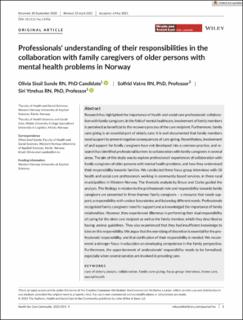| dc.contributor.author | Sunde, Olivia Sissil | |
| dc.contributor.author | Vatne, Solfrid | |
| dc.contributor.author | Ytrehus, Siri | |
| dc.date.accessioned | 2022-02-10T11:56:56Z | |
| dc.date.available | 2022-02-10T11:56:56Z | |
| dc.date.created | 2022-01-04T12:55:35Z | |
| dc.date.issued | 2021 | |
| dc.identifier.citation | Sunde, O. S., Vatne, S., & Ytrehus, S. (2021). Professionals' understanding of their responsibilities in the collaboration with family caregivers of older persons with mental health problems in Norway. Health & Social Care in the Community. | en_US |
| dc.identifier.issn | 0966-0410 | |
| dc.identifier.uri | https://hdl.handle.net/11250/2978232 | |
| dc.description.abstract | Research has highlighted the importance of health and social care professionals' collaboration with family caregivers. In the field of mental healthcare, involvement of family members is perceived as beneficial to the recovery process of the care recipient. Furthermore, family care-giving is an essential part of elderly care. It is well documented that family members need support to prevent negative consequences of care-giving. Nevertheless, involvement of and support for family caregivers have not developed into a common practice, and research has identified professional barriers to collaboration with family caregivers in several areas. The aim of this study was to explore professionals' experiences of collaboration with family caregivers of older persons with mental health problems, and how they understood their responsibility towards families. We conducted three focus group interviews with 18 health and social care professionals working in community-based services, in three rural municipalities in Western Norway. The thematic analysis by Braun and Clarke guided the analysis. The findings in relation to the professionals' role and responsibility towards family caregivers are presented in three themes: family caregivers – a resource that needs support; a responsibility with unclear boundaries; and balancing different needs. Professionals recognised family caregivers' need for support and acknowledged the importance of family relationships. However, they experienced dilemmas in performing their dual responsibility of caring for the older care recipient as well as the family member, which they described as having unclear guidelines. They also experienced that they had insufficient knowledge to take on this responsibility. We argue that the exercising of discretion is essential for the professionals' responsibility, and that clarification of their responsibility is needed. We recommend a stronger focus in education on developing competence in the family perspective. Furthermore, the apportionment of professionals' responsibility needs to be formalised, especially when several services are involved in providing care. | en_US |
| dc.language.iso | eng | en_US |
| dc.publisher | Wiley | en_US |
| dc.rights | Attribution-NonCommercial-NoDerivatives 4.0 Internasjonal | * |
| dc.rights.uri | http://creativecommons.org/licenses/by-nc-nd/4.0/deed.no | * |
| dc.title | Professionals' understanding of their responsibilities in the collaboration with family caregivers of older persons with mental health problems in Norway | en_US |
| dc.type | Peer reviewed | en_US |
| dc.type | Journal article | en_US |
| dc.description.version | publishedVersion | en_US |
| dc.rights.holder | © 2021 The Authors. | en_US |
| dc.source.journal | Health and Social Care in the community | en_US |
| dc.identifier.doi | 10.1111/hsc.13456 | |
| dc.identifier.cristin | 1974328 | |
| cristin.ispublished | true | |
| cristin.fulltext | original | |
| cristin.qualitycode | 1 | |

